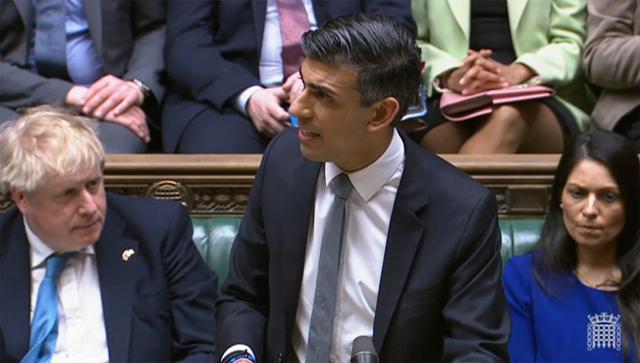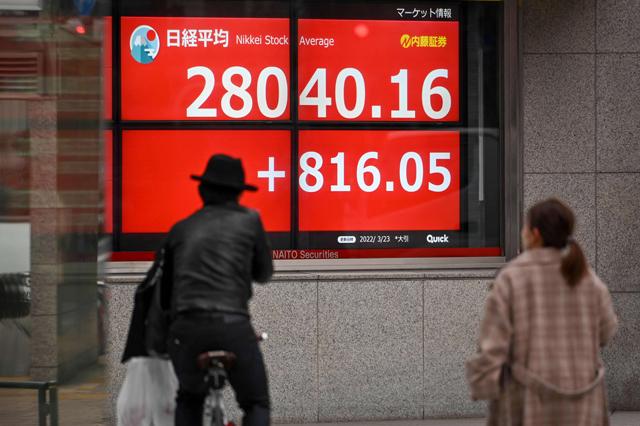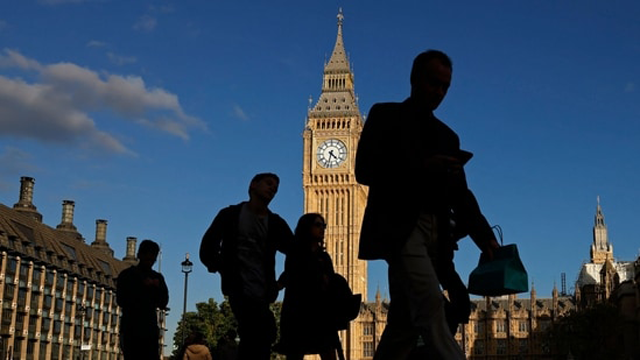You are here
UK confronts cost of living crisis
By AFP - Mar 23,2022 - Last updated at Mar 23,2022

A video grab shows Britain's Chancellor of the Exchequer Rishi Sunak gesturing as he presents the Spring budget statement to MPs at the House of Commons, in London, on Wednesday (AFP photo)
LONDON — British Finance Minister Rishi Sunak on Wednesday launched plans to ease a cost of living crisis, with growth set for a massive slowdown as the war in Ukraine and decades-high inflation pummel the economy.
In a budget update, Chancellor of the Exchequer Sunak unveiled measures to help household finances, including a cut on fuel duty and easing the tax burden for the lowest earners.
He also pledged to cut income tax in 2024, which is the last year when the next general election can be called by Conservative Prime Minister Boris Johnson.
Britain's economy will grow far slower than expected this year owing to the Ukraine war and soaring global inflation, Sunak told parliament.
The UK economy was set to grow 3.8 per cent in 2022, down from an official estimate of six per cent made in October.
'Prepare for worse'
Sunak said that the Office for Budget Responsibility (OBR) — the government's official economic forecaster — "has not accounted for the full impacts of the war in Ukraine and we should be prepared for the economy and public finances to worsen, potentially significantly".
"Their initial view, combined with high global inflation and continuing supply chain pressures means" the UK economy is forecast to grow significantly slower than thought.
Gross domestic product was estimated to expand a further 1.8 per cent next year, down from an official prediction of 2.1 per cent.
The OBR warned that should "wholesale energy prices remain as high as markets expect, energy bills are set to rise... pushing inflation to a 40-year high of 8.7 per cent in the fourth quarter".
UK annual inflation accelerated to a 30-year high at 6.2 per cent in February, official data showed on Wednesday.
Countries across the world are battling surging inflation fuelled by rocketing commodity prices over the Ukraine war and after nations exited pandemic lockdowns.
Sunak last month unveiled a package worth £9 billion ($11.9 billion, 11 billion euros) to help millions of low and middle-income households with energy bills, in particular.
Many household incomes are set to shrink further in April owing to a planned tax hike on UK workers and businesses to fund care for the elderly.
The same month, a cap on domestic gas and electricity bills will be increased because of a spike in wholesale energy costs.
Wage erosion
While Sunak has been comforted by news that UK unemployment has fallen to pre-pandemic levels, rising wages are being eroded at the fastest pace in eight years as inflation soars.
"Higher inflation will erode real incomes and consumption," the OBR said.
It said that "with inflation outpacing growth in nominal earnings and net taxes due to rise in April", real living standards are set to fall by a record amount this year.
The main opposition Labour party attacked Sunak for failing to help all financially-struggling families.
"For all his words it is clear that the chancellor does not understand the scale of the challenge," Rachel Reeves, finance spokesperson for the main opposition Labour party, said in response to the budget update.
"He talks about providing security for hard-working families but his choices are making the cost of living crisis worse."
Spiking global inflation has forced central banks around the world to lift interest rates, including the Bank of England.
Rising interest rates are significantly increasing governments' debt repayments, which ballooned over the past two years on vast pandemic costs.
Related Articles
LONDON — Oil prices surged while stock markets fell on Wednesday on renewed fears over Russian energy supplies and soaring inflation.Crude f
LONDON — British inflation has jumped to a 41-year high on soaring energy and food bills in a worsening cost-of-living crisis, data showed W
LONDON — Britain's energy regulator on Friday announced a fall in household bills from July, catapulting a key cost-of-living issue into the

















